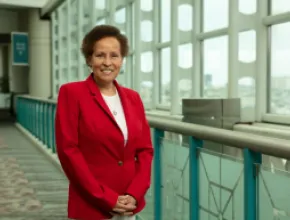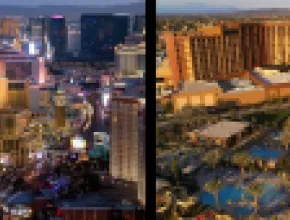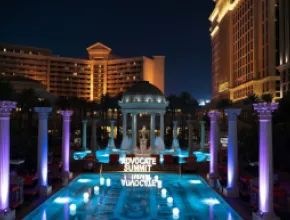Once primarily geared for leisure guests, an increasing number of gaming destinations are giving meetings the kind of attention they once reserved for high rollers. They are raising the ante on facilities, amenities and service support to make themselves more conducive to meetings than ever.
As the upgrades continue, planners are looking at gaming sites with new perspectives. Former concerns about too many attendee distractions at these sites seem to be evaporating, as groups find many other reasons to deal them in.
At the same time, however, veteran planners say that gaming destinations require their own set of planning strategies to ensure that the meeting—not the casino—remains the star attraction.
Planning Considerations
“Our clients look at a site like Las Vegas as a complete package, not just a gaming destination,” says Laurie Sharp, CMP, CEO of Sharp Events in San Francisco. “Vegas is Vegas because of its energy, variety, weather, shopping, and so many other things—gambling is just one of many choices. For some though, the same things that make it a draw also make it a concern.”
According to Sharp, agenda building for a gaming destination may require some strategies that are unique.
“You want to make sure you build in some free time so people can enjoy those distractions. If you try to host everything for three or four days, you’ll lose people,” she says. “And don’t end a conference on a Thursday at 6 p.m., Rather, close just prior to lunch so people will still have time to catch early afternoon flights.”
Session attendance checking via bar code technology is another way some organizations head off “seat attrition” at gaming destinations, Sharp adds.
“This is really only useful for an internal meeting, when you are concerned about spending a lot of money to deliver content,” she says. “This might not work with a customer event, because you don’t want to give the impression you are going to slap their hands later if they disappear.”
Space size and availability seem to be the biggest drivers to many destinations, including those that offer gaming, says Susan Keeley, marketing manager for The Performance Group (TPG) in Emeryville, Calif.
“We have a couple of clients who’ve met in Vegas for many years and they don’t lose people to the tables,” Keeley says. “Our site decisions are normally driven by space availability rather than gaming considerations. We have one client that does sales meetings for 2,200 people, and there aren’t many places that can handle their needs.”
Beyond Gaming
Gaming remains an entertainment feature at meetings destinations, but it’s not the main thing, say many planners.
An example on Louisiana’s Gulf shores is BP America’s two-day training meetings for the company’s oil rig maintenance teams at Lake Charles’ L’Auberge du Lac Hotel & Casino. The resort is situated on a lake, and has meeting space with access apart from the casino. BP chooses the site for reasons other than casino entertainment.
“Most of our guys live in Mississippi and Louisiana,” says Yvonne Flores, administrative assistant at BP America in Houston, “and it’s just a good location for us. We’d rather go there than to Houston with all its traffic and higher costs. These meetings are all business. We are the people who are cleaning up platforms that are underwater or leaning because of the hurricanes, and safety is our big agenda.
“Our guys put in long days, so gaming is not a factor,” Flores says. “If they’re bored in the evening, they are free to go to the tables if that’s what floats their boats. The excellent service, food and spaces at L’Auberge are why we return frequently.”
Booking gaming destinations can offer some challenges, however. TPG’s manager of planning and strategic sourcing, Stuart Patton, says there are caveats that don’t relate to attendee management.
“When you book a gaming resort, you often get slapped with steep attrition and cancellation penalties,” Patton says. “Facilities people sometimes make it hard to rebook a meeting to offset penalties. They are tough negotiators. In Vegas, if you need less than 800 room nights, you definitely want to get in touch with a dedicated small meetings team to get any attention at whatever hotel you’re dealing with. Leisure travelers may spend more money, and that is the kind of thing they are looking at.”
So while gaming may not be the main thing planners consider when looking at destinations that have it, its presence may bring a peculiar set of planning considerations that are absent elsewhere.
Pros and Cons of Gaming Sites
While stigma remains in some quarters about staging meetings at gaming destinations, some planners say the advantages can overtake the perceptions. Consider the arguments:
Pros
- Airfares, F&B and room rates can be more affordable at gaming destinations than other sites.
- Many events and meetings that occur in gaming destinations report significant spikes in attendance.
- Airlift to some gaming destinations makes them very accessible.
- The entertainment is taken care of, which eliminates some logistics for the planner.
- Gaming destinations are sometimes the only sites with facilities large enough to accommodate large meetings.
Cons
- Choice of a gaming destination “looks bad” to stakeholders and others.
- Attendees get distracted by bars, clubs and other pieces of 24/7 environments. They skip meetings to sleep or “play.”
- Some gaming cities are so popular it’s difficult to book space, especially in the prevailing seller’s market. Salespeople don’t return phone calls, or act as if your business isn’t of interest to them.
- Attrition penalties can be the highest anywhere at hotels in major gaming destinations.
- Smaller meetings can get lost in the meetings crush of giant casino hotels.





